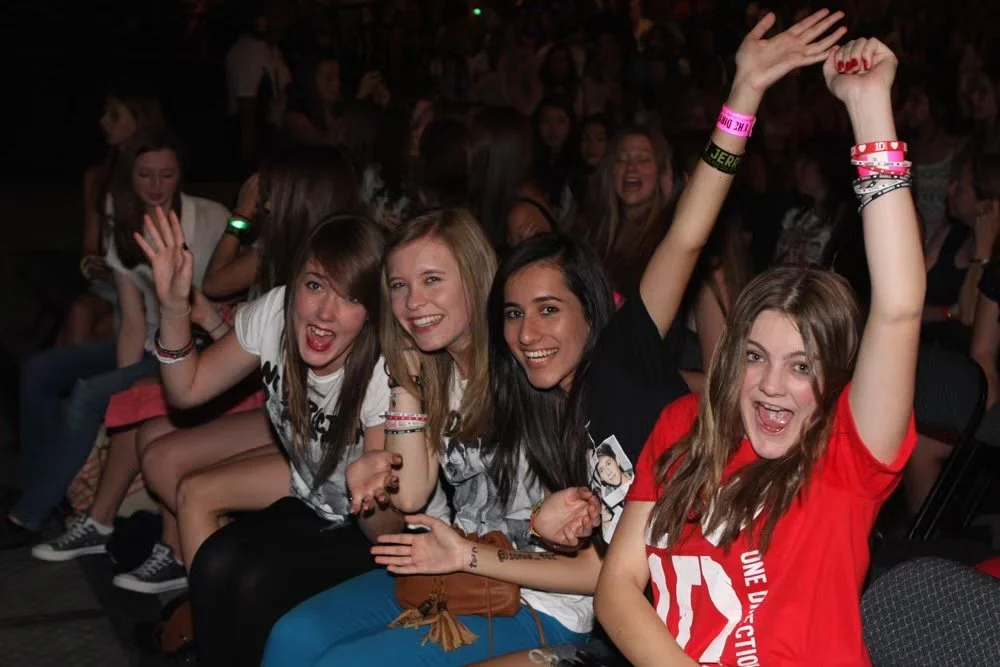Why do we ridicule fangirls? The misogyny behind the mockery
In the wake of Liam Payne’s death, Lucy Sarret explores why fangirls (including Directioners) are often dismissed despite their influence on pop culture.
One Direction in 2012 (Credit: Flickr/ Eva Rinaldi)
The world is mourning the unexpected loss of Liam Payne, former member of One Direction and pop culture icon. Payne’s death has left millions of fans –primarily young women who adored Payne at the prime of his fame – devastated.
Yet with their grief emerging across social media, something troubling has also surfaced: the relentless ridicule of fangirls, who are often met with scorn, mockery, and condescension for their emotions.
As fangirls express their heartbreak, they are judged by many. It's a cycle we've witnessed before, steeped in deep-rooted misogyny.
Liam in 2011 (credit: Flickr/ Sepideh)
The fangirl stereotype: too much, too emotional
Fangirls have long been caricatured as hysterical, obsessive, and irrational—deemed “crazy” for expressing their love for artists and celebrities like Liam Payne. Whether it’s camping outside hotels, lining up for hours at concerts, or tweeting passionately, their devotion is often dismissed as shallow and excessive.
But why? Why is the enthusiasm of young women for something they love met with such disdain?
The answer lies in societal norms that diminish anything associated with femininity. The emotional intensity fangirls bring to their experiences is frequently viewed as over-the-top or embarrassing.
This isn’t a new phenomenon. In the 1960s, Beatlemania saw young women screaming and crying for The Beatles, only to be mocked and describedas irrational or silly.
Fast-forward to 2010, when One Direction burst onto the scene, and the same stereotypes followed. Despite their global success, many dismissed the 1D fandom as “overly dramatic” or “too obsessed”.
One Direction skyrocketed from X Factor hopefuls to chart-topping heartthrobs, selling out stadiums worldwide. They reigned as pop kings for five years before Zayn left the group in 2015, and the band announced an indefinite hiatus the following year, which has now lasted longer than the band was together.
(Credit: Unsplash)
Yet, the One Direction fandom – known as Directioners, which 75% of our followers on Instagram have shared that they are – remains unwavering in its support. The Directioner community played a massive role in the band’s success, but was consistently mocked in the media and online. Whether fans were camping outside venues or streaming their songs to break records, fangirls were trivialised.
But these fans wielded enormous influence. In 2015, Directioners set a Twitter record with #DragMeDown, surpassing five million tweets in one day.
The #DragMeDown campaign originated when One Direction released their single of the same name after the departure of member Zayn Malik. Instead of allowing the narrative of the band's struggle to overshadow their comeback, Directioners rallied together in a show of solidarity and support.
Their collective efforts not only propelled the single to the top of music charts but also demonstrated their significant impact on social media.
Read more: Editors on…our cultural highlights
Fandom as female empowerment
What is often misunderstood about fangirls is that their devotion isn’t just about celebrity worship – it’s about community.
In her book Fic: Why Fanfiction is Taking Over the World, Dr. Anne Jamison explains that "Fandom is a space where fans gather to share their love for a particular work, creating a sense of belonging and identity that transcends mere consumption”.
"In fandom, passion becomes a communal experience, a way for fans to connect over shared interests and emotional investments", she writes.
The One Direction fandom wasn’t just about bedroom posters. Fans raised money for charities, broke social media records, and launched massive campaigns for the band.
For example, Directioners raised thousands of dollars for Believe in Magic, a charity supported by Louis Tomlinson, after his mother passed away in 2016 (yes, the charity was later found to be dodgy, but that’s besides the point I’m trying to make). This wasn’t just celebrity obsession – it was an act of collective compassion and mobilisation.
Directioners at a concert in the early days (Credit: Flickr/ Eva Rinaldi)
Fandom also provides representation. For many young women, being part of the One Direction fandom was their first experience of belonging to something larger than themselves. It offered a sense of identity and community, where their voices mattered, and their passion was understood.
A tweet from last week penned by a former Directioner reads: “I was made fun of for liking one direction for years and maybe my fanaticism was a bit ridiculous. but i cannot deny that the experience changed my life and brought me closer to people i never would have otherwise. the sense of community was soo special and i’ll miss that forever.”
Our very own culture editor, Kiran, was a proud Directioner in her teenage years.
When asked about Liam’s death, she shared: “It's sad when anybody dies, but this one hurt a lot. This was someone who was culturally significant in our teen years, which was a huge period of change and it brings back a lot of nostalgia.
“It's like a piece of my teens has gone. I was a fan of many boy bands and it was a big part of girlhood.”
Read more: Is girlcore feminist?
The fangirl economy
It’s time we recognise the dedication and loyalty of fangirls for what it is: a form of commitment and connection that transcends the mockery it often receives. The One Direction fandom alone generated millions in revenue, propelled the band to global stardom, and helped shape social media culture in the 2010s.
The truth is, capitalism owes much of its success to the buying power of young girls. Fangirls are not just pop culture influencers –they are economic powerhouses.
In today’s economy, the “girl” is both a powerful consumer and a symbolic figure driving markets while constantly being asked to prove her worth.
According to investment bank Piper Sandler's semi-annual "Taking Stock With Teens" survey, which has been conducted for over two decades, teenage girls drive major trends in fashion, beauty, and entertainment, shaping markets. The survey in 2021 reported that U.S. teens had an average annual spending power of $2,165 per teen, emphasizing the influence of young female consumers on the retail industry.
Ypulse, a youth research agency, also reported that young women, specifically Generation Z, are driving significant spending in fashion, beauty, and pop culture, with over 70% of teenage girls surveyed identifying as “brand-conscious.” They hold tremendous sway over what becomes popular in the market.
Pop culture giants like Taylor Swift and Beyoncé have collectively pumped billions into the economy – Swift’s Eras Tour generated an estimated $4.3 billion in the US alone, while Beyoncé’s Renaissance Tour contributed $4.5 billion, both aiding post-recession recovery.
As a Belieber, our very own Amelia Reynolds was an OG fangirl (Credit: Supplied)
The so-called "girl economy" is thriving, and young women are at its forefront. Yet, despite their undeniable economic power, society continues to belittle teenage girls and their cultural contributions.
Platforms like Reddit are filled with subreddits solely dedicated to hating Swifties –fans who are predominantly female and young. Meanwhile, older male users dominate forums criticizing the very shows, music, and products that drive the girl economy.
Cultural misogyny and the ridicule of fangirls
The mockery aimed at fangirls is ultimately rooted in misogyny. Society has long dismissed the interests of young women, trivialising things that are popular among them while glorifying what men enjoy.
This disparity reveals how culture systematically devalues female emotion. When men are emotionally invested in something –whether it’s a sports team or a film franchise –their passion is seen as valid. But when young women express similar emotional investment in artists like Taylor Swift or even astrology, it’s often belittled as frivolous.
“Teenage girls, their tastes, and their market power now occupy a bizarre place in popular culture”, according to an article on Shit You Should Care About. “They are still reviled; saying that something was made for teenage girls is still an easy way to disparage a piece of music or a film or a book. Simultaneously, they are revered and dreaded as arbiters of all that is cool.
“And amid all this reviling and revering, they are fetishised as the ultimate audience for advertisers. Teenage girls form a market share worth its weight in gold.”
What’s also incredibly ironic is that, comparatively, fan girls, for all the shit they get, actually cause less harm than male fanbases.
Of course, there are always the ones that take it too far, with stalking, obsessive parasocial relationships, and so on. But the majority of fangirls (and fans in general) are simply passionate about a certain person or topic.
Professor Sarah Banet-Weiser, co-author of Believability: Sexual Violence, Media, and the Politics of Doubt, told Refinery29: "As far as I know, most of the cases of fans stalking and being violent against celebrities are men.
"The idea that women fans are unstable is a real issue as it connects to women being seen as irrational," she explains.
The Women’s Media centre also said: “The fan behaviors of grown men, things like storming the court or riots and death threats, are normalized, and the fan behaviors of young girls and women waiting for the newest Twilight book or creating fan trailers and posters are described as ravenous or even rabid.”
Directioners were mocked for their tears when Zayn Malik left the band in 2015, and again when the band announced its hiatus later that year. Today, following Liam Payne’s death, fangirls are once again the target of ridicule – but who are they hurting?
Social media is filled with TikToks of fans grieving, many hiding their tears from boyfriends who might mock them for mourning a pop star.
TikTok One Direction fan mocked by her boyfriend for crying over Liam Payne’s death
This is not new. A Reddit thread from 11 years ago showing Directioners eagerly waiting to be let inside a concert venue has comments from users suggesting security should use “cattle prods” and more gross puns that these UNDERAGE girls “want the 1D”.
Emotions are valid – whether it’s pop stars or football players
The sadness felt by Liam Payne’s fans is just as valid as any sports fan’s grief over their favorite player or actor. Fangirls have grown up in a world that tells them their feelings don’t matter, that what they love is silly or shallow.
This isn’t just about fandom; it’s about how society teaches women to suppress their emotions or feel shame for expressing them.
It’s time we value the passion and loyalty of fangirls for what it truly is: dedication and connection that deserves respect. One Direction’s fandom helped create millions in revenue, shaped pop culture, and influenced social media trends. The truth is, capitalism would be nowhere without the buying power of young girls.
Their dedication shouldn’t be diminished simply because it comes from young women.
Former 1D members put out a statement about Liam (Credit: Instagram/ @onedirection)
A cultural shift is needed
The disdain for fangirls is not just about pop culture –it’s a reflection of how society views women and their interests. It’s about the way young girls’ emotions are treated as inferior, less intellectual, and worthy of scorn.
To honor Liam Payne’s legacy, we must also honor the fans who made him the icon he was. These fans aren’t "crazy" – they’re passionate, engaged, and part of a culture shifting to embrace the things young women love.
I was never a hardcore Directioner, but as a teen in the 2010s, One Direction was everywhere. I remember where I was when they announced their break: I was texting my friends on Snapchat, all of us shocked, trading thoughts on the band’s future. Even those of us who weren’t massive fans felt the ripple effect of their hiatus because, for years, they were an inescapable force in pop culture; a huge part of what it meant to be a teenage girl.
Fangirls deserve the same respect we give to male sports fans or comic book ‘nerds’. They’ve built communities, shaped an era of music, and made lasting cultural contributions. Instead of mocking them, it’s time to celebrate them.







